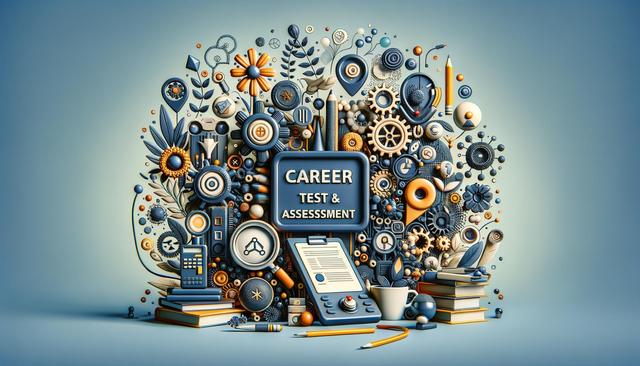Understanding the Purpose of a Career Assessment
A career assessment is more than just a personality quiz—it is a structured tool designed to help individuals identify how their personal attributes align with various professional roles. These assessments typically evaluate areas such as interests, values, aptitudes, and personality traits. By analyzing these components, a career assessment offers valuable direction for anyone navigating career exploration, whether they are just starting out or considering a shift in their professional path.
Many people take a career test at transitional points in life, such as after graduation, during a job search, or when contemplating a major career change. The goal is to gain clarity on your goals and find a job fit that aligns with your natural preferences and abilities. These assessments often provide a list of suggested career fields, along with insights into why those fields may be a good match based on your results.
Some of the key benefits of a well-structured career assessment include:
- Understanding your professional strengths and weaknesses
- Identifying careers that align with your interests and values
- Gaining confidence in your career decisions
- Saving time and resources by focusing on suitable paths
Ultimately, the purpose of a career assessment is to offer career guidance that helps you make informed, realistic, and fulfilling choices about your future.
How Career Tests Work
Career tests come in a variety of formats, from simple questionnaires to more in-depth psychometric evaluations. Most assessments begin by asking a series of questions about your preferences in work environments, tasks, and interpersonal dynamics. These responses are then analyzed to create a profile that highlights your core personality style, motivations, and potential areas of interest.
Some popular types of career tests include:
- Interest inventories: Focus on your likes and dislikes across various work-related activities
- Personality assessments: Explore how your traits influence your job fit
- Skills evaluations: Identify your current competencies and areas for development
These results can help you see how your characteristics align with different roles and industries. For example, someone with strong interpersonal skills and a preference for collaborative environments may be well-suited for careers in counseling, education, or human resources. Meanwhile, individuals who enjoy working independently and have analytical strengths might find satisfaction in research or technical fields.
By combining multiple assessment types, you can build a comprehensive picture of your career potential and make more targeted moves in your job search or academic planning.
Using Results for Career Exploration
Once you’ve completed a career test, the next step is to use the results as a springboard for deeper career exploration. This process involves researching the recommended roles, industries, and educational pathways. It’s important to remember that career assessments are tools—not prescriptions. They offer guidance, not final answers.
To make the most of your results, consider these steps:
- Research the job descriptions and daily tasks for suggested roles
- Look into required qualifications or certifications
- Explore potential salary ranges and job outlooks
- Connect with professionals in those fields for informational interviews
Career exploration should also include self-reflection. Think about how the suggested paths align with your long-term goals, lifestyle preferences, and values. Are you more motivated by creative expression, financial stability, or making a social impact? These considerations can help refine your choices and lead to a more satisfying outcome.
Additionally, career assessments can be a useful starting point for working with a career coach or advisor. These professionals can help interpret your results, suggest alternative options, and guide you through the decision-making process.
Recognizing Your Professional Strengths
One of the most empowering aspects of a career assessment is the opportunity to recognize your professional strengths. Knowing what you’re good at—and what energizes you—can inform not only your career choice but also how you present yourself in resumes, interviews, and networking situations.
Professional strengths may include:
- Communication skills
- Leadership abilities
- Analytical thinking
- Creativity
- Technical expertise
Identifying these strengths helps you understand your value in the workplace. It also enables you to seek roles where you can thrive, rather than just survive. For example, if your assessment highlights strong problem-solving skills, you might explore careers in consulting, engineering, or project management. If your creativity stands out, roles in design, marketing, or content development could be a good fit.
In addition to guiding career choices, understanding your strengths contributes to personal development. It encourages goal setting, continuous learning, and a proactive approach to career growth.
Integrating Career Guidance into Your Journey
Career guidance is an ongoing process, not a one-time event. While a career test offers a snapshot of where you might fit professionally, true career satisfaction often comes from staying open to learning and adapting. As industries evolve and personal interests shift, your career path may change as well.
Integrating career guidance into your journey involves:
- Periodic reassessments to reflect personal and professional growth
- Staying informed about emerging fields and opportunities
- Building a strong network for support and advice
- Seeking mentorship and coaching when needed
By treating your career as a dynamic journey rather than a fixed destination, you give yourself the flexibility to grow and adapt. Ongoing career guidance helps ensure that you remain aligned with roles that match your values and skills while opening doors to new possibilities.
Whether you’re a student, early-career professional, or someone considering a shift, using career assessments and guidance tools can be a strategic way to navigate the evolving landscape of work.
Conclusion: Taking the First Step Toward Clarity
Choosing a career path can feel overwhelming, but tools like career assessments provide clarity by highlighting your strengths, interests, and possible directions. Whether you’re just starting out or rethinking your current path, these tools support thoughtful, informed decision-making. By exploring your job fit and professional strengths through structured career guidance, you equip yourself with the insights needed for meaningful and fulfilling work. Begin your journey with curiosity and openness, and let each step in your career exploration bring you closer to a future that reflects who you truly are.




Leave a Reply